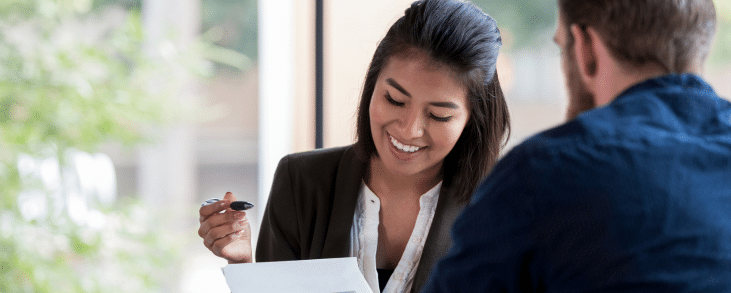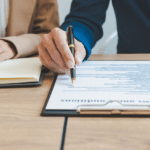Staying in business as a small business, nonprofit enterprise or agricultural co-op can be incredibly challenging. A lot of the time, these ventures live and die on cash flow and even seemingly minor disruptions to the amount of cash available can have dire consequences. In those cases, Economic Injury Disaster Loans (EIDL) are designed to bridge the gap. These are federally administered by the SBA and are often a lifeline to small businesses.
But if your business doesn’t have the money to make EIDL payments, the stress can be overwhelming. That’s when you might start asking, “Am I personally liable for an EIDL loan?” Here’s what to know about EIDL personal guarantee rules and what to do if you can’t repay your EIDL.
Are You Personally Liable For An EIDL Loan?
Depending on your loan amount, you might have had to provide an EIDL loan personal guarantee at the time of signing.
To recap EIDLs: Small businesses could be eligible to borrow up to $2 million in EIDLs – either through the general EIDL program or the COVID-19 EIDL program. For the COVID-19 EIDL program, payments could be deferred for two years, even though interest accrues from the loan’s origination date.
EIDL loan personal guarantee requirements
For EIDLs, collateral is required if the amount is over $25,000. A personal guarantee from a borrower is required for loans over $200,000. All entities owning 20% or more of the business must provide a guarantee.
So, in short form, the personal guarantee requirement for EIDLs means: if your loan was under $200,000 or you don’t own 20% or more of the business you are most likely not personally liable for an EIDL. If your loan was over $200,000 and you do own 20% or more of the business, you are personally liable.
EIDL collateral requirements
Keep in mind that providing collateral and being personally liable for the loan are two separate things. Even though you are not personally liable for an EIDL under $200,000 that doesn’t mean there are no consequences for failing to make payments. For EIDLs over $25,000, it’s necessary to provide collateral in the form of a UCC-1 – essentially, a lien on business assets. This means that if your business isn’t able to repay the loan, the SBA can seize its assets to recover the cost of the loan.
Depending on the amount of the loan this could include real estate but is more likely to include assets such as accounts receivable or inventory.
Breakdown of the EIDL Loan Agreement
EIDLs can be lifelines to small organizations facing extraordinary financial circumstances. Because of this, it’s not uncommon for business owners to sign the agreements without having a full understanding of the terms of the EIDL. Here’s a recap of the EIDL basics.
| EIDL | COVID-19 EIDL | |
| Use of proceeds | Working capital and normal expenses | Working capital to meet operating expenses, payment and pre-payment of business debt |
| Terms | Payments deferred for 12 months, interest does not accrue for first 12 months | Payments deferred for 24 months, interest accrues from origination |
| Interest rate | Will not exceed 4% | Businesses: 3.75% fixedPrivate nonprofit organizations: 2.75% fixed |
| Maturity | Up to 30 years | 30 years |
It’s important to know both what the funds can be used for and when interest begins accruing on your EIDL – these are both important details for your finances. You could be held personally liable if EIDL funds were misused. And, similarly, if you miscalculate the interest on your business’ EIDL you could be surprised by larger-than-expected payments when it comes time to start repaying.
Understanding Default and Delinquency in EIDL Loans
What happens when you can’t repay your EIDL? There are two options.
- The SBA could classify the loan as delinquent. This means you’re behind on payments, but they expect you to keep paying and eventually catch up. You might be charged a late fee.
- The SBA could classify your EIDL as in default. This means they believe you are no longer going to be repaying your loan and they will have to proceed to other measures to recover their funds. They could pursue you personally for payment, even if your business has closed. This can impact both your business and personal credit.
If your EIDL is in default and you’re starting to wonder, “Am I personally liable for an EIDL loan?” it’s a good idea to prepare for legal action by seeking the advice of a qualified debt relief attorney. Proactive action by your financial attorney could prevent a lawsuit.
Protecting Yourself from Personal Liability
The easiest way to protect yourself from EIDL personal liability is to borrow less than $200,000 or ensure that you meet the terms of the EIDL loan agreement after you borrow larger sums. But, that’s obvious. Chances are you probably aren’t reading this if you’re having an easy time meeting that agreement. So, let’s take a look at your options if you are unable to repay an EIDL.
- SBA hardship-reduced payments: You can work with the SBA to negotiate more manageable payments if you have documentation of a hardship that prevents you from keeping up with your current payments.
- Offer in compromise: You used to be able to submit an offer in compromise to the SBA, which is essentially a negotiated debt settlement that can avoid a lawsuit. However, in June 2023 the SBA announced they are no longer accepting offers in compromise for COVID-19 EIDLs.
- Declare bankruptcy: Business bankruptcy and personal bankruptcy could be the best option to limit the negative consequences of being unable to repay an EIDL. This is not an easy decision and should be made with the direct support of an experienced attorney.
EIDL Loans and Bankruptcy: Can You Discharge an EIDL?
Yes, you can discharge an EIDL loan in bankruptcy. If you’re considering bankruptcy, there are three types of bankruptcy can help you avoid personal liability for an EIDL:
- Chapter 7: This can often reduce almost all the SBA EIDL debt a business owner is liable for.
- Chapter 13: This could reduce the SBA EIDL debt a business owner is personally responsible for.
- Chapter 11: This could reduce SBA EIDL debt.
If your business has already closed, the window for filing for Chapter 11 bankruptcy might have passed, but if your business is in the process of closing now could be a good time to consult with an attorney about your best step forward.
Seeking Legal Advice: When to Consult an Attorney
If you are having difficulty making SBA EIDL payments and are concerned about going into default – or if you are currently in default and considering your options, it’s smart to consult with an experienced debt relief attorney who can advise you on the best path to take. These situations can be very overwhelming and the worst thing to do is nothing. Take control of your financial future by consulting with an attorney who can help you avoid personal liability lawsuits for an SBA EIDL.







